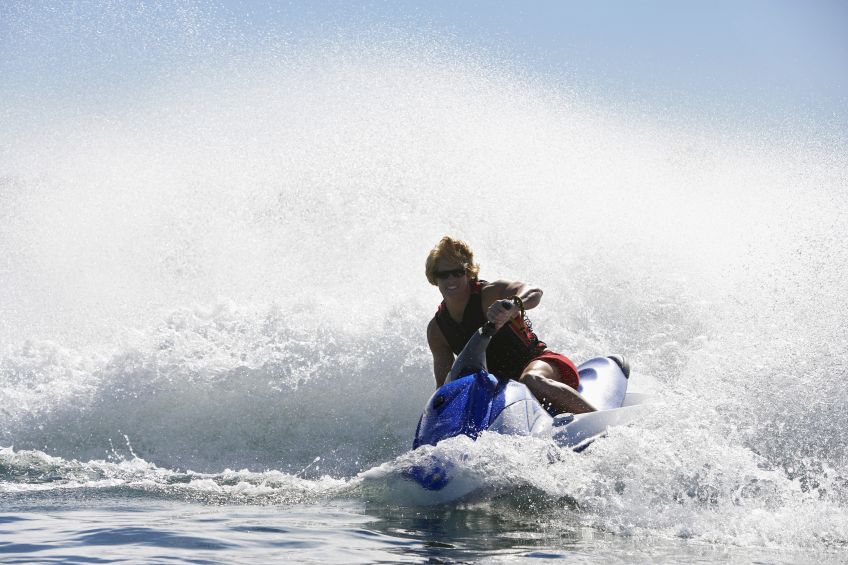Personal Watercraft Accidents
June 16, 2014 | Category: Boating Accidents, Wave Runner Accidents | Share According to the United States Coast Guard, of the 4,062 boating accidents which occurred in the United States in 2013, the most common recreational boat types involved in these accidents were open motorboats (46%), personal watercraft (18%), and cabin motorboats (17%). There were 560 deaths and 2,620 injured. Many of these accidents are the result of inattention on the part of the operator or boating under the influence (BUI).
According to the United States Coast Guard, of the 4,062 boating accidents which occurred in the United States in 2013, the most common recreational boat types involved in these accidents were open motorboats (46%), personal watercraft (18%), and cabin motorboats (17%). There were 560 deaths and 2,620 injured. Many of these accidents are the result of inattention on the part of the operator or boating under the influence (BUI).
Personal watercraft, including wave runners and jet skis, are affordable, easy to use, and have relatively low transportation and maintenance costs. Because of these factors, personal watercraft have significantly increased the number of water enthusiasts in the United States.
The U. S. Coast Guard defines a personal watercraft as a "craft less than 13 feet in length designed to be operated by a person or persons sitting, standing or kneeling on the craft rather than within the confines of a hull".
Reckless or careless driving, is the leading cause of personal watercraft-related accidents. The Personal Watercraft Act of 2005 says that every personal watercraft shall at all times be operated in a reasonable and prudent manner. No person shall operate a personal watercraft in an unsafe or reckless manner. Unsafe personal watercraft operation includes, but is not limited to, the following:
(1) Becoming airborne or completely leaving the water while crossing the wake of another vessel within (100 feet) of the vessel, creating the wake, or wake jumping.
(2) Weaving through congested traffic.
(3) Operating a vessel at greater than slow/no wake speed within (100 feet) of an anchored or moored vessel, shoreline, vessel underway, dock, pier, boat ramp, marina, swim float, marked swim area, person in the water, person(s) engaged in angling, or any manually-propelled vessel.
(4) Operating contrary to the "Rules of the Road" or following too close to another vessel, including another personal watercraft.
Collier County Boating Accident Attorney, Randall Spivey of Spivey Law Firm Personal Injury Attorneys, P.A. says, "Personal watercraft are a popular way of enjoying Florida's many waterways and beaches. Before going out on the water, it is important for personal watercraft operators to review the information provided below. You need to act responsibly and be safe."
Yamaha-motor.com provides a safety checklist poster with helpful information for everyone enjoying Florida's waterways using a personal watercraft. This checklist covers such information as:
- Protective clothing and equipment, including U.S. Coast Guard-approved life jackets, for operators and passengers.
- Personal watercraft controls including keeping the lanyard attached; how to start and stop the engine, and knowing the operational controls.
- Avoiding collisions including not releasing the throttle when steering, scanning constantly for people and objects, and operating the personal watercraft safely and defensively.
- Avoiding aggressive maneuvers.
- Keeping away from the intake grate which has moving parts capable of causing entanglement.
- Not applying the throttle when anyone is at the rear of the personal watercraft.
- Follow rental agency rules and boating laws.
- Know how to right the personal watercraft in open waters.
- Know the waters.
- Follow additional personal watercraft warnings and instructions.
Boating experts agree that it is essential for personal watercraft operators to give their full attention to operating their watercraft safely. They should always be on the lookout for hazards including swimmers, water skiers, divers, people parasailing, as well as manatees and floating debris. It is also important operators only carry the number of passengers for which the personal watercraft was designed.
In addition, the U.S. Coast Guard provides a link to the PWCSafetySchool.com on which personal watercraft enthusiasts can find current information on safe boating by state. After reviewing the information, boaters may take a test and receive a boater certification card for a fee of $15.
Collier County Safe Boating Attorney, Randall L. Spivey is a Board Certified Trial Attorney – the highest recognition for competence bestowed by the Florida Bar and a distinction earned by just one (1%) percent of Florida attorneys. He has handled over 2,000 personal injury and wrongful death cases throughout Florida. For a free and confidential consultation to discuss your legal rights, contact the Spivey Law Firm, Personal Injury Attorneys, P.A., in Lee County at 239.337.7483 or toll free at 1.888.477.4839,or by email to Randall@SpiveyLaw.com. VisitSpiveyLaw.com for more information. You can contact Spivey Law Firm, Personal Injury Attorneys, P.A.in Charlotte County at 941.764.7748 and in Collier County 239.793.7748.

